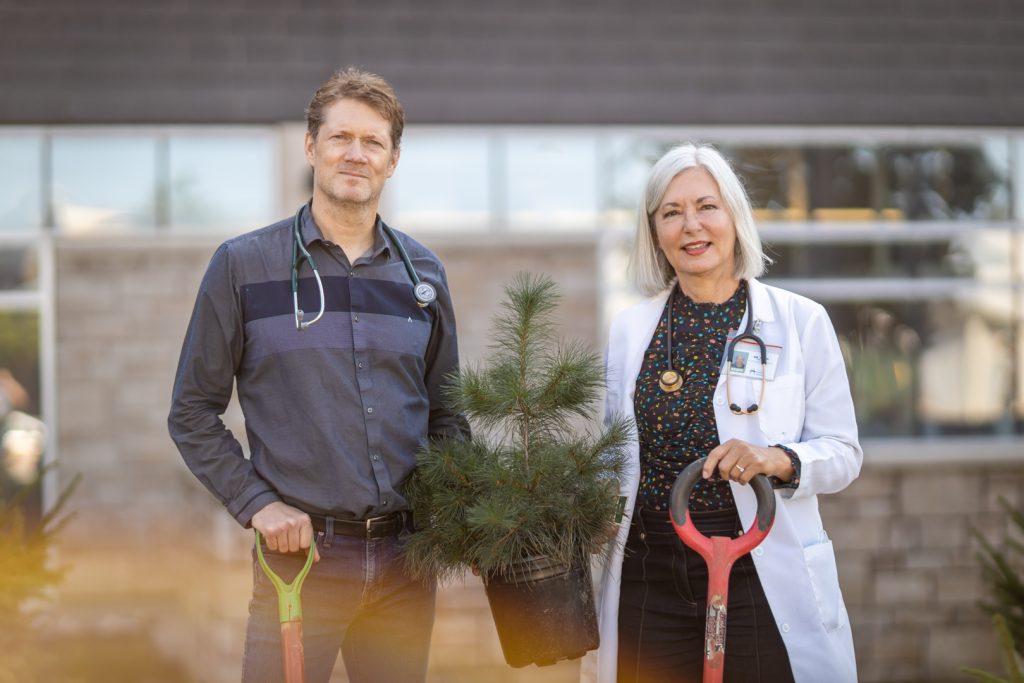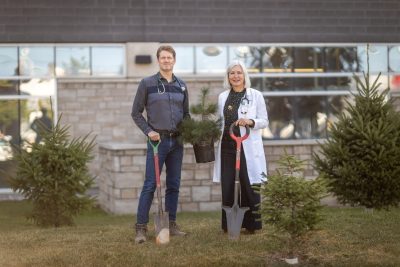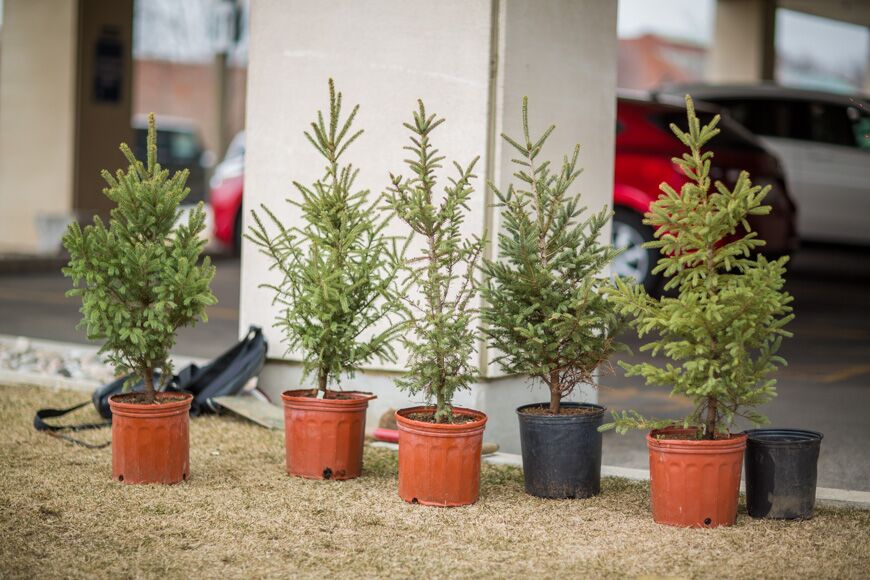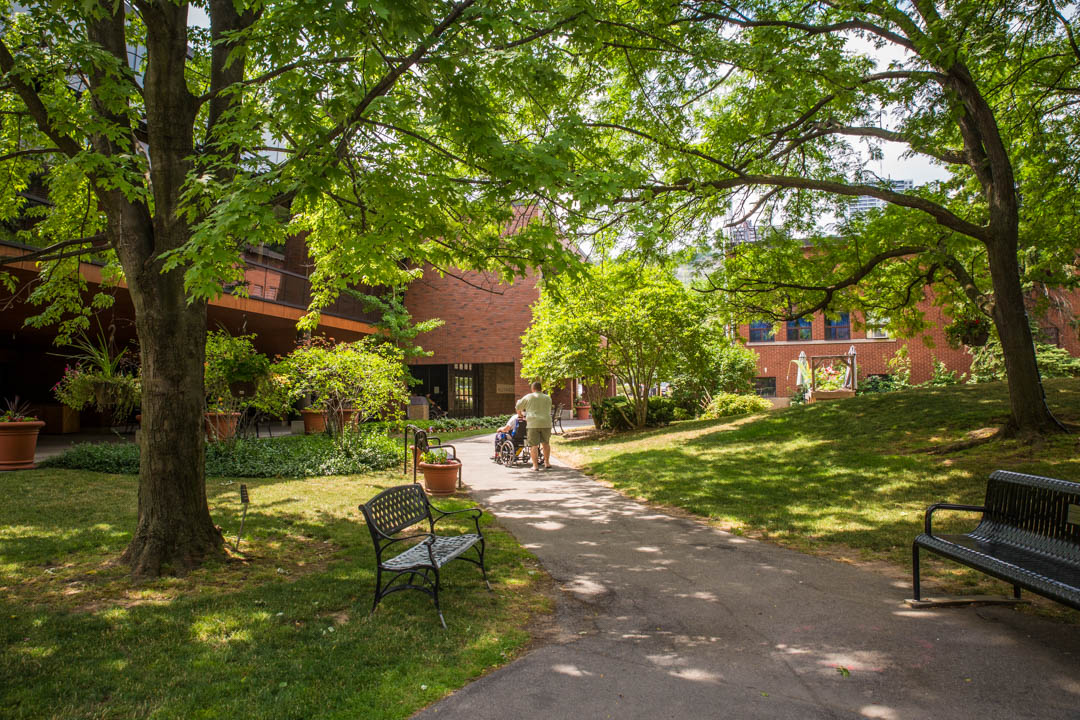
Province-wide tree planting project takes root at HHS
Hamilton Health Sciences’ chief of rehabilitation medicine Nora Cullen is trading her stethoscope for a shovel on Friday, Sept. 23 to help plant 20 trees at Hamilton General Hospital (HGH).
“I’m passionate about trees and the environment,” says Dr. Cullen, a physical medicine and rehabilitation specialist based at HGH. Cullen will help plant several varieties of trees including honey locust, Kentucky coffee, Shumard oak and American elm.
This is part of a launch of a province-wide initiative that will see thousands of trees planted at hospital and health care facilities across the province over the next five to 10 years to honour and celebrate Ontario’s health care workers. A second Hamilton Health Sciences (HHS) planting will take place on Saturday, Sept. 24 at St. Peter’s Hospital that will include paper birch, blue beech, witch hazel, bur oak, Kentucky coffee and elderberry trees.
“We share the goal of trying to create an oasis at these places.” — Dr. Myles Sergeant, HHS
The initiative, called Trees for Health Ontario, is led by the non-profit tree planting charity, Trees for Life under its Trees for Heroes program. Trees for Life’s mandate is to double the urban tree canopy across Canada. Its participating organizations include Trees for Hamilton, a local charitable organization that plants trees in the city, and PEACH, (Partnerships for Environmental Action by Clinicians and Communities for Hospitals and Health Care Facilities), whose mission is to motivate and empower Ontario’s health care workers to participate in climate action at their sites. Trees for Hamilton and PEACH are partnering for the HGH and St. Peter’s plantings.
Bringing the forest to the patient
Cullen is one of several HGH doctors from the rehabilitation medicine department who have volunteered to plant trees. They are joined by fellow HHS physician Dr. Myles Sergeant, who’s based at St. Peter’s Hospital where he specializes in complex care and aging. Sergeant volunteers for PEACH as a member of its executive team, and also for Trees for Hamilton, which he co-founded.
“The Trees for Health Ontario project is all about human health, fighting climate change and honouring health care workers,” says Sergeant.

Dr. Myles Sergeant and Dr. Nora Cullen
“Evidence shows that access to nature and green spaces benefits our mental and physical health. This includes positive outcomes for heart rates and blood pressure, stress levels, mood and self-esteem, obesity, type 2 diabetes, cardiovascular disease, post-operative recovery, birth rate and children’s cognitive development.”
Trees also improve air quality, beautify the landscape, and help combat climate change.
Branching out, province-wide
In previous years, Trees for Hamilton planted trees at HGH, St. Peter’s, St. Joseph’s Healthcare Hamilton and several long-term care facilities. These were local initiatives, and not part of the new province-wide planting project.
“We share the goal of trying to create an oasis at these places,” says Sergeant, who’s excited to see more trees planted at hospitals and health care facilities in Hamilton and across the province.
“It’s all about bringing the forest to the patient,” says Sergeant. “Hospitals are anchor institutions, like universities, colleges and libraries. They should be beautiful and they should set examples for other communities.”
Hikes vs hockey
Sergeant grew up in Dundas, where his childhood memories include family hikes in nearby forests. Even so, his love of forests took root slowly. “To be honest, I disliked the hikes because all my friends would be at home playing street hockey.”
But over time, a love for nature grew on him. A long-distance runner and varsity athlete, he trained on wooded trails. “Beyond building fitness, I was getting all of the other benefits of being in the woods, such as stress relief and an overall sense of well-being.”
The plantings at HGH and St. Peter’s take place during National Forest Week, from Sept. 18 to 24. Guests at the Sept. 23 planting will include Mark Cullen, an expert gardener, author, broadcaster, volunteer chair for Trees for Life, and member of the Order of Canada for his work promoting trees. “He might be the biggest name in trees in Canada,” says Sergeant.
He’s also the brother of Dr. Nora Cullen.
Family tree
For Mark and Nora Cullen, the apple didn’t fall far from the tree. Their father Len Cullen founded Weall and Cullen Nurseries in 1944 and Cullen Country Barns in 1979, and went on to found Cullen Gardens and Miniature Village in the 1980s, a popular Ontario tourist attraction for 25 years.
“I’m passionate about controlling climate change.The easiest way to do that is to plant a tree.” — Dr. Nora Cullen, HHS
The Cullen siblings grew up working for the family businesses, leaving them with a lifelong appreciation of trees and nature. “I’m passionate about controlling climate change,” says Nora Cullen. “The easiest way to do that is to plant a tree.”
Mark Cullen took over the family business. His tree-planting work includes the Highway of Heroes tree campaign, which saw 2 million trees planted along the Highway of Heroes section of the 401 from Trenton to Toronto. These trees honour every Canadian soldier who volunteered for service since Confederation and including the War of 1812.
Trees for Health Ontario, meanwhile, will honour health care workers by beautifying the province’s hospitals and health care facilities.
“Our staff and doctors go the extra mile every day for our patients,” says Sergeant. “They’ve had a very difficult couple of years due to the pandemic and it’s important to recognize the work they do.”
Trees for Health Ontario participating organizations include: Trees for Life; PEACH; Trees for Hamilton; One Bench One Tree; Ontario Parks Association; Landscape Ontario; Forests Ontario; and EcoHealth Ontario.


